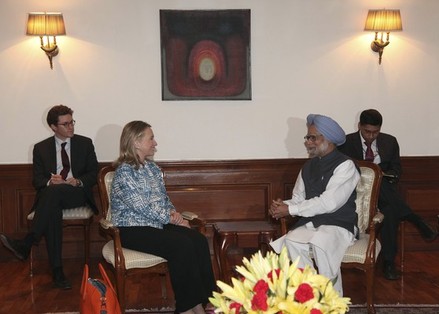
New DelhI/Kolkata, May 8: India wants Iran to fulfill international obligations with regard to its nuclear programme, but New Delhi cannot lose sight of its energy security needs, Prime Minister Manmohan Singh told US secretary of state Hillary Clinton during a wide-ranging discussion here on Monday.
Iran was an important aspect of Hillary's meeting with Singh on Monday evening as she made it clear that US expects India to "do more" and be part of the international effort to curb Iran's reported bid to acquire nuclear weapons by defying inspection regimes.
The PM is understood to have said that India shared concerns over proliferation but needed to work out its responses at a time when fuel prices are high and the global economic situation worrisome. In comments ahead of the meeting, Hillary said India's has more options on energy than it had earlier.
The meeting, according to official sources, did not hit a bump on Iran despite both leaders outlining their views and Singh dwelling on the need to engage Tehran. The discussion lasted around 80 minutes, about half an hour more than what was scheduled, as the leaders went over Pakistan, Afghanistan, China, trade, security and the Indo-US civil nuclear agreement.
While both sides committed to strengthen their strategic partnership, tangible outcomes may take a while to be fully evident with the relationship seen to be in need of fresh momentum despite substantial convergence of interests.
US is keen on India moving on some reforms like liberalizing FDI in retail, a detail expected to have figured during Hillary's meeting with West Bengal chief minister Mamata Banerjee in Kolkata earlier in the day where she spoke of making the state a partner in US investment.
The meeting with Banerjee was significant as the US looks at West Bengal with new eyes after the state was "off bounds" during Left rule. The attempt to size up the new dispensation saw Banerjee also using the occasion to claim that Bengal was now investor-friendly.
After Hillary's meeting with Singh, sources said "The full gamut of bilateral relations came up for discussion." On Iran, the PM is also believed to have laid out India's reasons to continue to engage the state. Hillary had already indicated earlier in the day that she would press India to further reduce oil imports from Iran, although she acknowledged reduction in some imports. She stressed Iran's nuclear ambitions would have an adverse effect on the region.
On the security front, Afghanistan, China and Pakistan figured prominently in the talks. But the PM used the opportunity to tell the top US official American investment in infrastructure while the leaders also had an elaborate discussion on the state of the global economy.
Earlier in Kolkata, contentious issues, including the Teesta water-sharing agreement with Bangladesh, were kept under wraps. "There were certain strategic issues that came up in course of discussion, but I cannot reveal them because of political compulsion," Banerjee said after Hillary left for Delhi.
"They (the US) spoke of making Bengal a partner state for investment here," the Bengal CM said. "For a long time, there was hardly US investment in Bengal due to political reasons. But, now the situation has changed and is congenial for investment," she added.
Banerjee welcomed private investment in sectors such as information technology, education, healthcare and deep sea ports. At an interactive session at La Martinere for Girls' before her meeting with Banerjee, Hillary was clear about what she wanted to discuss. "I intend talking about investment ... and the Teesta water agreement with chief minister Mamata Banerjee. But I would be primarily interested in her vision for Bengal and the east. I would like to know what she wants to achieve. I have come here with a belief that India can compete. But you understand that there are political compulsions. So, a few things might have to wait," Hillary added.





Comments
Add new comment